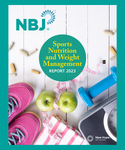Monitor: Natural shoppers more likely to use non-sugar sweeteners, despite risks
The World Health Organization and others are speaking out against non-sugar sweeteners, but consumers stick with them regardless of the possible health issues.

That America has a sweet tooth cannot be denied: Average sugar consumption is more than twice recommended intake. When all those sweet tooths encounter non-sugar sweeteners and consumers are told of the associated health risks, the matter becomes more complex, however.
In new research from New Hope’s NEXT Data & Insights team, natural channel shoppers are not only more likely than all shoppers to say they use non-sugar sweeteners, including stevia, but they are also more likely to continue using them when informed that they present no advantage for weight management and carry health risks. Such findings are reflected in a recent statement from the World Health Organization.
In the survey, 58% of natural channel shoppers said they use non-sugar sweeteners that could include stevia. When told that there was no benefit for weight management and that sweeteners carry health risks, 40% of natural channel shoppers said they were likely to continue using them. The numbers for all consumers, which include the natural channel shoppers, was notably lower, with 35% reporting they use the products and 20% saying they would continue to use them after hearing the risks and lack of benefits.
Unpacking all of this is complicated. Sugar has clearly earned its demonization. Added into everything from pasta sauce to sriracha, sugar presents a host of problems, including weight gain, tooth decay and cardiovascular disease. It’s natural for people to want to avoid it and opt for a lower-calorie options when they can tolerate the taste of the non-sugar sweeteners. But, as the WHO noted, the sweeteners present problems of their own and offer few of the benefits for which consumers might be buying products containing them. WHO specifically called out artificial sweeteners like aspartame and saccharin, but also sweeteners consumers may think of as “natural,” including Stevia. The statement did not address sugar alcohols like erythritol, but such ingredients were called out in a study earlier this year as presenting risks to heart health.
The takeaways for the natural products industry are far from simple. Stevia, monk fruit and erythritol are common in the natural aisles, and natural channel shoppers’ higher rate of use and willingness to continue using after hearing the negative findings means those products are unlikely to disappear. To strategize around product development and education for existing products, it might help to see why consumers are turning to non-sugar sweeteners.
The greatest number of respondents among both natural channel shoppers and total consumers cited maintaining current weight as a reason to use non-sugar sweeteners. Weight loss was chosen by a significantly lower number. Tooth decay was an issue for a substantial number of respondents and despite the WHO and others questioning the benefits for healthy blood sugar, half of natural channel shoppes and 43% of total shoppers said they bought the non-sugar-sweetened products to control their blood glucose levels.
With the exception of tooth decay, the sweeteners by many accounts miss the mark on delivering the benefits that drive consumers to purchase, raising a question of whether it is time for a reckoning in the natural products industry. We have seen products claiming “less sugar” and that could be the next and most responsible step. Even people with unapologetic sweet tooths will occasionally complain of a product being “too sweet,” whether it’s sugar or stevia. The news of health risks and lack of benefit in non-sugar sweeteners leads to a lower percentage of people saying they will continue using sweeteners suggests willingness to step away from sweet products. In the end, lower calorie may be a healthier answer than no calorie. Education on how to cut back sugar without adding in questionable ingredients may even boost brands that adopt the lower sugar strategy.
What the newer information around health risks also tells us is to question the race for new sweeteners. Vast sums are being spent chasing a holy grail of a sweetener that matches the taste of real sugar and at the same offers no health risks. The sweetener race hasn’t paid out yet and may not ever.
That Americans have a sweet tooth cannot be denied, but that doesn’t mean non-sugar sweeteners are an answer the natural products should be selling.

About the Author(s)
You May Also Like




